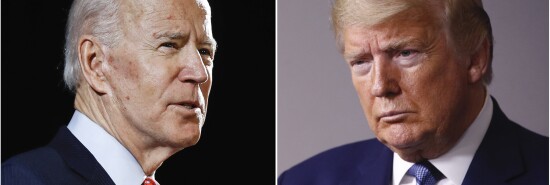
Years of political upsets show that Trump and Biden could lose
Quin Hillyer
Video Embed
History shows it is sheer nonsense to assume that President Joe Biden and former President Donald Trump each have a lock on their respective parties’ 2024 presidential nominations.
One of the commentariat’s worst instincts is its repeated habit of prematurely declaring political races over. Huge numbers of voters pay only passing attention to politics until soon before they cast votes, and a significant number change their minds several times in the course of a political campaign.
IT’S TIME FOR SEVERAL REPUBLICANS TO QUIT THE PRESIDENTIAL RACE
More often than the pundits admit, mass shifts in the same direction can occur, sometimes because of unexpected events and sometimes because a slow accumulation of sentiments can quickly reach critical mass. Shifts in political momentum, like the Ernest Hemingway line about bankruptcies, often happen “gradually and then suddenly.”
While past is not necessarily prologue, it stands to reason that if a certain sort of occurrence has happened numerous times before, something like it definitely can — although it certainly is not obligated to — happen again.
In that light, history has shown repeatedly that political outcomes aren’t inevitable. Consider the following examples:
1980 presidential election: On Oct. 27, just eight days before the election between Democratic President Jimmy Carter and Republican challenger Ronald Reagan, the Gallup organization’s poll showed Carter ahead by 3 points. On Oct. 28, Reagan put on a debate performance for the ages. On Nov. 4, Reagan outpaced Carter by 9.7% in the popular vote, taking 44 states and a 489-49 electoral vote landslide.
1988 presidential election: On the weekend before the Aug. 15-18 Republican National Convention in New Orleans, Vice President George H.W. Bush’s campaign manager, Lee Atwater, prowled around the Bush campaign’s hotel suites in a foul mood, fuming about Bush’s whopping 17-point polling deficit to Democratic Massachusetts Gov. Mike Dukakis. Nothing seemed to be going Bush’s way. Eleven weeks later, Bush beat Dukakis by 7.7%, a nearly 25% swing, while winning 40 states and a 426-111 Electoral College victory.
1976 presidential election: This almost was the biggest comeback in presidential election history. Carter, a former governor of Georgia, emerged from the Democratic National Convention on July 15 with an astonishing lead of 33%. Less than three months later, Republican President Gerald Ford pulled into a polling dead heat. Only one of the worst gaffes in presidential debate history — Ford ludicrously insisted that “there is no Soviet domination of Eastern Europe” — stalled the Republican’s surge. In the end, Carter won by just 2.1% — still a 31% slide since July — and Ford would have won in the Electoral College if he had received just 11,117 more votes in Ohio and 14,464 more in Mississippi.
1991 Louisiana gubernatorial election: With just three weeks to go in the nightmarish election runoff between the corrupt former three-term governor Edwin Edwards and the former national Ku Klux Klan leader David Duke, Duke pulled within the polling margin of error — a statistical dead heat — in the most widely respected Louisiana poll. And Duke, who mastered the television medium and claimed to have jettisoned his viciously bigoted past, had in several recent campaigns performed better on Election Day than polls had predicted. In the final three weeks, though, three years of accumulated evidence of Duke’s continuing neo-Nazi ties finally made Louisiana voters see the light. Edwards won in a 22.3% landslide.
And that’s just a sampling. Presidential nomination campaigns, meanwhile, are even more prone to massive swings in polling fortune. Among Republicans, John McCain’s 2008 effort seemed absolutely dead in the water, tanking in the polls and financially tapped out, but he came all the way back to win the Republican nomination on the first ballot. In 2012, former Pennsylvania Sen. Rick Santorum languished in the low single digits in national polls and below 10% throughout 2011 in the early caucus state of Iowa. He ended up winning Iowa (although a miscount robbed him of momentum from that victory) and 10 other state contests, and he came within 10,000 votes in Ohio and 3 percentage points in Michigan of knocking front-runner Mitt Romney from the race.
CLICK HERE TO READ MORE FROM THE WASHINGTON EXAMINER
And in earlier contests, Democrats Edmund Muskie in 1972, Jerry Brown in 1992, and Hillary Clinton in 2008 were all considered formidable front-runners. Ditto for Republicans George Romney for the nomination of 1968 and Rudy Giuliani for 2008. And for 2016 the two front-runners as the campaign began were Jeb Bush and Scott Walker. Of those, only Clinton even came somewhat close (but unsuccessfully) to actually winning the nomination; the rest fizzled badly.
More than four months before the first votes are cast, therefore, this race remains far from preordained. Especially with the two parties’ front-runners wildly unpopular among polling majorities and both facing major legal and age-related questions, either one could easily lose his standing. Indeed, with a correctly calibrated seismograph, it might be possible to feel the Earth rumbling beneath both of them already.
